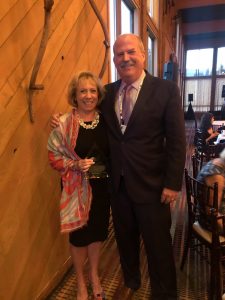
Where do you work and live (e.g. what is your day job)?
I work here in Vancouver, and my job, at the moment, is about 2/3rd as the Executive Vice Dean of the Faculty of Medicine, and about 1/3rd of the time I do clinical work and my clinical research programme.
What is your primary research focus?
My area of expertise is reproductive infectious diseases, which is basically any infectious complications that affect people from an OBGYN perspective. And I have a research programme.
What drew you to that subject?
I did an undergraduate degree in Microbiology, and have always had an interest in infections and infectious complications. As a resident I did some infectious disease projects as part of my research training, working on Chlamydia and Trichomonas. And then I had the opportunity to find out about the Infectious Diseases Society for Obstetrics and Gynecology (IDSOG), and go to their meetings, and realize people actually did this as a subspecialty in the States – nobody did this in Canada at the time. So I went away, did the fellowship in the States and came back and was the first person trained in this area in Canada.
What do you find are the biggest challenges in pursuing research while being a clinician?
Time. Particularly in the early days, it was very hard to protect time to really think out research questions, to then work up to putting together a protocol, and getting funding… And clinical research often takes a long time over which it needs to be conducted to get results, so it requires a lot of perseverance and patience.
How do you juggle your different roles as clinician, researcher, and administrator?
I think you have to be really disciplined, and I think over the years I’ve developed the ability to jump from one thing to another quite quickly. And I do somewhat “blended” time, where I run with all the different roles (research, clinical, administrative, etc.) in parallel, and try to be disciplined when I jump between them. Because you can’t completely abandon clinical work. And if you completely leave your research, then big gaps go in – you know, deadlines pass and so on. And the administrative work, it has constant “crisis-du-jour” issues to deal with.
What are the greatest supports for your research?
People. I have been very fortunate to be able to build a great team. They are key to moving the research – the “machine” – along, whether it’s writing a grant, or running a trial, so it’s not dependent on me every minute of every day.
What are your thoughts on having been awarded the Lifetime Achievement Award from the Infectious Diseases Society for Obstetrics and Gynecology (IDSOG)?
I was absolutely thrilled and honoured. This organization has been my “touchstone”. I go to the meetings nearly every year, and I have close contact with many of the persons there whom I can reach out to, from time to time, for advice. They have helped to keep me on track, especially at the beginning when I was the only person in Canada in this subspecialty. The Society is full of brilliant, very accomplished people. So yes, I was just thrilled to be the recipient of this award. (Read about Dr. Money’s work with the WHRI and IDSOG during her time as President of IDSOG, here.)
What are your future plans and goals? What would you like your research to achieve?
I have three main domains that I do research in. Firstly, I do work in HPV and cervical cancer, and my collaborators and I are working very hard on a strategy for cervical cancer elimination – this is something that I would like to see us get to collectively, in my career lifetime. Secondly, the work in understanding the safety and toxicity of anti-retrovirals in pregnancy is ongoing – we want to understand optimal therapeutic agents to treat women with HIV infection. But thirdly, probably the biggest thing that I would love to achieve is, with our intra vaginal microbiome work, that we actually get to the point that we have a microbiome- or metagenomics- based diagnostic – or diagnostics perhaps – that we are able to use to both identify women who have particular conditions, and also for targeted treatment. We’re interested in studying the microbiome and its role in HPV, cervical cancer oncogenesis, and infectious morbidity in pregnancy. In all of these projects I work in very big collaborative teams: we have some amazing basic scientists, and social scientists, and other discipline experts that we bring in, which allows us to do some pretty amazing things because our team as a collective is so much better than individuals.
When you aren’t busy with work – what do you do for fun?
I’m very keen on sports and exercise. I run; I play field hockey; I ski; I golf. I travel, and I have wonderful family and friends. Athletics and sports are what I do for fun, and they’re also my stress relief.
What did your childhood “self” aspire to be, if you hadn’t become a clinician/researcher?
I had wanted to be a nuclear physicist! I have no idea why exactly, but that was actually my junior high school / high school goal. I thought it was… …fascinating. And then I turned out to be nothing like that!
Read the WHRI article about Dr. Money’s work with the WHRI and IDSOG during her time as President of IDSOG.
Stay tuned for future Feature Researcher Profiles to come!